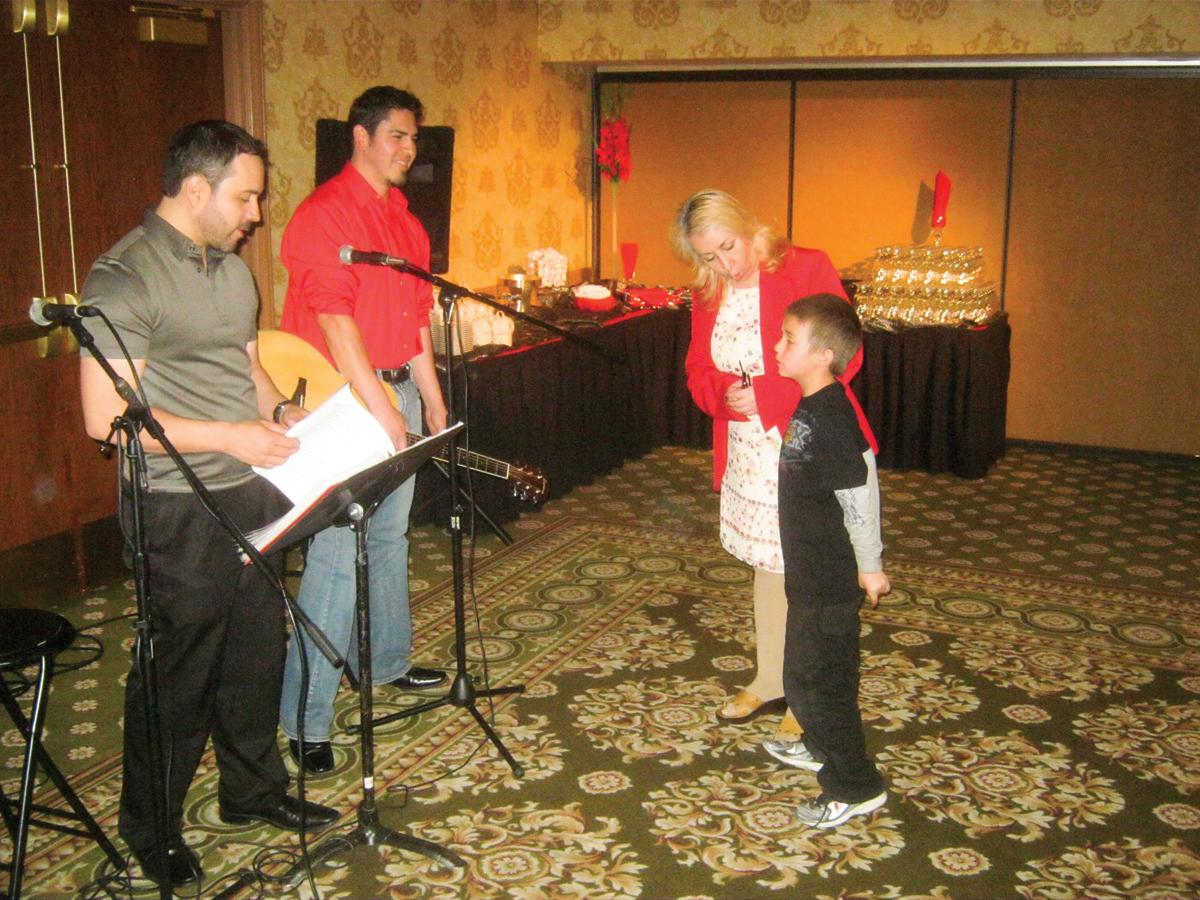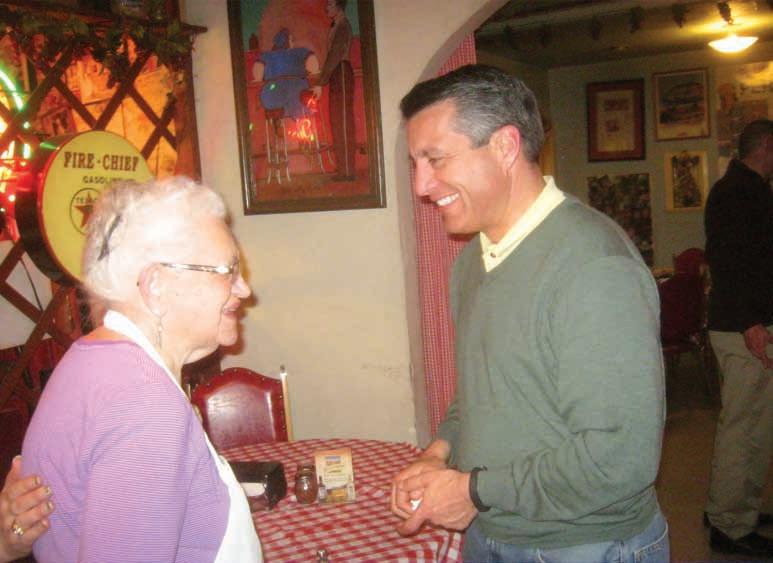
10 minute read
News
from April 4, 2013
Museums Inc.?
There is a dispute underway among supporters of the state’s historical museums about their future.
Advertisement
The focus of their concern is Senate Bill 145 and Assembly Bill 384. Those measures are being described as a way to make the museums private. Last week, historical appraiser Howard W. Herz, who has written books on casino history, sent out a letter calling attention to the bills.
“Initially, I was a supporter of the [Friends of the Nevada Historical Society] group, as I have been very active in helping the society since 2006,” he wrote. “I have been well aware of their financial burdens and excellent performance in spite of it. In 2012, I became aware that this group of supporters (now the Nevada Historical Foundation), had changed their focus and had begun to seek support to take the society into private hands, privately administer the society, fire the present employees (state employees), appoint their own director, strip the museum of its artifacts and turn the Society into essentially a manuscript research-only facility.”
Retired NHS employee Phil Earl said he was aware of the Foundation’s activities, but he did not take an unfavorable view.
S.B. 145 would regulate public/private partnerships. A.B. 384 deals with how historical material is handled after it comes into state ownership and authorizing the state Division of Museums and History to enter into contracts with private nonprofit groups.
However, Assemblymember Pat Hickey pulled the assembly version, saying, “The bill’s requesters thought they had a deal worked out to help privately fundraise for the Nevada Historical Society. They did not.”
Prevailing wage study released
The University of Nevada, Reno economics department has released a study of prevailing wages and their impact.
Prevailing wage laws require that the approximate average local wage be paid on public works. Such laws are intended to prevent business from using its enormous influence to drive down wages. In Nevada business has made efforts in most recent legislatures to get the law repealed or its provisions cut (“Prescription for recovery: cut wages,” RN&R, March 14).
The UNR study compared effects on construction costs and construction wages among Mountain states that repealed prevailing wage laws (Arizona, Colorado, Idaho and Utah) with Mountain states where the laws were retained (Montana, Nevada, New Mexico and Wyoming). It found repeal has only a minor impact on wages but drives substantial cuts in employee benefits like health insurance, resulting in increased use of government social services.
The prevailing wage is determined by surveys of the state labor commissioner, though some are caustic toward that office these days. “[T]he existing prevailing wage law has been only sporadically enforced,” wrote columnist Andrew Barbano recently. Responses from employers to the newest survey are due July 15.
Krolicki backs pipeline
Nevada Lt. Gov. Brian Krolicki joined 21 other state lieutenant governors in endorsing the Keystone XL pipeline.
“On behalf of 22 Republican lieutenant governors nationwide who have responsibilities for promoting economic development and job creation within their states, we urge that this Administration recognize the overwhelming benefits to the states and their citizens associated with the building of this critical pipeline,” read a letter to President Obama signed by Krolicki as chair of the group.
“We see a tremendous positive economic impact for states directly resulting from the construction of this national strategic asset. Welders, electricians, heavy equipment operators and families in virtually every state in the U.S. will be the recipients of more jobs and bolstered local economies.”
In January 2012, President Obama vetoed the pipeline application after protests about its environmental impact. The application has been retooled to try to satisfy those concerns.
—Dennis Myers
Elvira Diaz introduces her son Christan to Cesar Reyes and Chris Reyes, who—as the duo Eross—provided the music at the annual Cesar Chavez banquet in Reno on March 28.
Getting straight
Political parties mend their ways
After decades in the wilderness, Latinos and gays are being fiercely courted by by politicians. Dennis Myers In D.C., Democratic senators have been abandoning their previous positions on marriage equality with such alacrity that journalists have had difficulty keeping up-to-date tallies. And their Republican counterparts, still smarting from the 2012 election, have begun shaving the edges off their most hard-edged issue policy positions, particularly immigration, to widen GOP appeal to Latinos.
Beverly Cevcick
There are parallels to these kinds of activity back in Nevada, though with less intensity—in the Republican case, with only a low flame.
At the annual Cesar Chavez banquet last week at Circus Circus— organizers give the dinner to the casino/hotel because it is one of two union houses in Reno—Elvira Diaz wandered among the tables chatting with friends and musing on the GOP effort to get straight with Latinos.
“I feel very excited because now, Latinos, we will be going out and vote and now we count. ... [W]e participate, and it’s very interesting for me because now they’re going to listen to our issues. And for us, it’s important they listen to our issues so we can have, you know, a better life here.”
Voter registration volunteer Zuly Lopez, working at the event, said of the change in GOP strategy, “I think that’s great. I think it’s about time.”
She said in her experience—such as at her church—there are Republican Latinos, which provides fertile ground for the party to till.
Evan Prostero Vargas, a community organizer working on voter registration, said he wants both parties to be pursuing Latino votes.
“We are definitely thankful [for the more welcoming attitude from Republicans],” he said. “We are pushing for the cause, which is immigration reform. We want both Democrats and Republicans to be on the same page.”
But the banquet itself was not exactly proof of the Republican effort to court Latinos. Though the event was an obvious opportunity for Republicans, no GOP party or elected officials attended. As best could be determined, there was one prominent Republican in the room, and that one didn’t want to be interviewed. A dinner organizer tried to find a Republican without success. The single Republican present noted privately that Republicans make far more of an effort at the annual NAACP dinner. She speculated that while the GOP is courting Latinos, it’s less comfortable running that courtship at an event honoring a Latino icon who was also a labor leader.
Veteran Republican strategist Pete Ernaut said later that he thinks candidates missed a bet.
“It certainly is disappointing not to see more Republicans at this important function,” he said. “The key to getting people in your corner is putting in the work, using the elbow grease, and I think most Republicans would be well-served to remember that.”
That left the hall to Democrats like Washoe County Commissioner Kitty Jung, whose commission district has the highest percentage of Latinos of the five commission seats. Perhaps surprisingly, she did not knock the new Republican tactics.
“I think it’s great,” she said. “I think every group and subgroup should have the political muscle that all parties want to solicit their vote. I think it makes Latinos stronger.” The previous day, the Washoe Democratic Party had held a fundraising dinner at the same time as a campus commemoration of Cesar Chavez at which Democratic Sen. Ruben Kihuen spoke. Asked if there was a danger of Democrats taking Latinos for granted, Jung said that if she had anything to say about it, that would be avoided.
“Wow, I sure hope we don’t, because they’ve sure come out for us at the national level, the state level and certainly at the local level,” she said. “I guess I should be cautiously optimistic that we’re a little more progressive in advanced thinking than to consider we just automatically get somebody’s vote. I think we work pretty hard for every vote that we get.”
There was a certain amount of wishfulness that Republicans had come around without having to be hit over the head in the election, but also a we’ll-take-what-we-can-get attitude. Diaz put it this way:
“I would love to say they should do it because it’s the right thing to do, but sometimes you’ve got to train communities to do a mind change, and the important thing is, at the end of the day, if they do the right thing … we’ll work together and do good things for the community.”
The other side
Last month, as March 26 Supreme Court arguments on marriage equality approached, Democrats in the U.S. Senate were scrambling to get straight on the issue, particularly after new opinion polls showed rapidly changing public sentiment. If the Supreme Court

overturned anti-gay laws, Democrats who failed to change would be stuck with anti-gay positions.
Senate Democrats Claire McCaskill of Missouri on March 24, Jay Rockefeller of West Virginia, Tim Johnson of South Dakota, and Mark Warner of Virginia on March 25, Jon Tester of Montana on March 26, and Kay Hagen of North Carolina on March 27 switched their positions in various ways. Meanwhile, congressional Republicans were spending up to $3 million to support the legal fight against marriage equality.
In Nevada, Democrats didn’t make a show of changing their stances as federal Democrats did. Until this year’s Nevada Legislature, only two state legislative Democrats were known to be outright supporters of marriage equality—former senator Sheila Leslie of Washoe County and Sen. David Parks of Clark County.
But if legislative Democrats did not call news conferences, they did reveal their changes of mind with a different kind of gesture. Nine senators and seven assemblymembers put their name on a constitutional amendment to let voters decide whether to repeal the state’s ban on marriage equality. Not one Republican in either house took a similar position.
In a Senate hearing last week, lawmakers’ testimony was overshadowed by those more directly affected, like Beverly Sevcick: “For me, if you love someone, you marry that person. It breaks my heart that I cannot marry a person I love so much and have spent the last four decades with.”
Independent American Party member John Wagner countered, “God ordained marriage be between a man and a woman.”
Nevadans in 2002 approved a state constitutional ban on marriage equality, a vote that was a product of an initiative petition. Change was already under way—constitutional amendments sponsored by signatures must be voted on twice, and support for the measure declined by three percent in 2002 from 2000.
A constitutional amendment sponsored by the legislature must pass two legislative sessions by simple majorities and then be voted on by the public once. An opinion survey commissioned by the Retail Association of Nevada on various legislative issues and released in February showed that 54 percent of those surveyed support marriage equality. Approval of the legislative proposal would spare marriage equality supporters the effort of gathering signatures for an initiative petition as well as the financial cost of an additional election. Ω

Elvira Diaz Latina leader


Personal welcome




ELVIN BISHOP
SATURDAY, APRIL 6
LOCAL NATIVES
SATURDAY, APRIL 13
ROY ROGERS & THE DELTA RHYTHM KINGS
SATURDAY, APRIL 27
SAMMY HAGAR – FOUR DECADES OF ROCK
FRIDAY, MAY 3 & SATURDAY, MAY 4
Tickets available at Ticketmaster.com or SouthShoreRoom.com
Inez Casale, known to her longtime customers as Mama Casale, spoke with a distinguished visitor, Gov. Brian Sandoval, at her Halfway Club in Reno. The Club, a bar and restaurant, has been a fixture in the valley since it opened in the 1930s on Fourth Street in the long gap between Reno and Sparks—when there was a long gap between Reno and Sparks.
See box office for details and age restrictions. Shows subject to change or cancellation. Must be 21 or older to gamble. Know When To Stop Before You Start.® Gambling Problem? Call 1-800-522-4700. ©2013, Caesars License Company, LLC.









